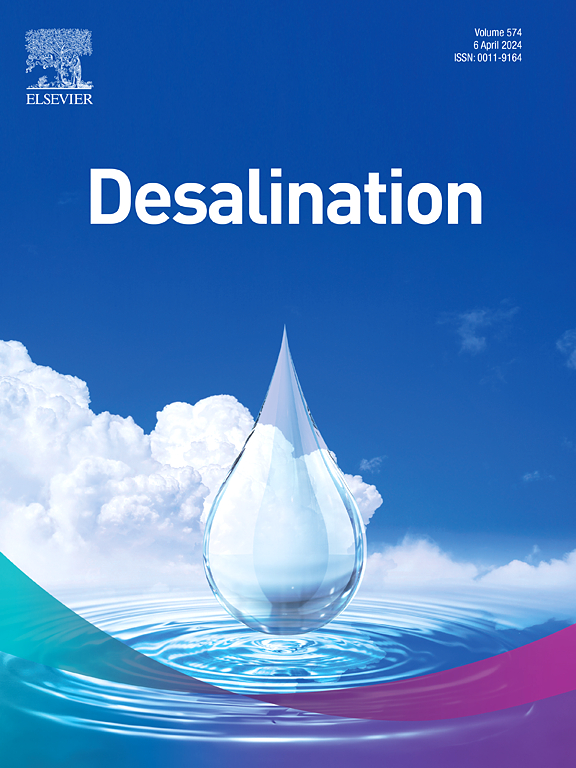优化可持续能源系统:以地热为动力的海水淡化用于绿色制氢的比较研究
IF 8.3
1区 工程技术
Q1 ENGINEERING, CHEMICAL
引用次数: 0
摘要
氢与水之间的协同作用对于迈向可持续能源的未来至关重要。本研究探讨了地热能与海水淡化和制氢系统的整合,以满足水和清洁能源的需求。设计并比较了两种配置,一种使用多效蒸馏(MED),另一种使用反渗透(RO)。两种配置都利用了地热能,MED 直接利用地热,而 RO 则将地热能转化为电力,为海水淡化提供动力。根据各种性能指标对系统进行了评估,包括净输出功率、淡化水产量、氢气产量、放能效率和平准化成本。使用人工神经网络(ANN)和遗传算法(GA)进行了多目标优化,以确定最佳运行条件。结果表明,基于反渗透技术的系统具有更高的制水效率,可实现更广泛的最佳解决方案,并降低水(LCOW)和制氢的平准化成本,而基于 MED 技术的系统在特定条件下具有经济优势。一项以加拿大为重点的案例研究说明了这些系统在支持氢动力汽车和居民用水需求方面的潜在优势,强调了使用优质淡化水提高质子交换膜电解槽(PEME)的寿命和效率的重大影响。这项研究为地热能在可持续水和氢气生产中的最佳利用提供了宝贵的见解。本文章由计算机程序翻译,如有差异,请以英文原文为准。
Optimizing sustainable energy systems: A comparative study of geothermal-powered desalination for green hydrogen production
The synergy between hydrogen and water is crucial in moving towards a sustainable energy future. This study explores the integration of geothermal energy with desalination and hydrogen production systems to address water and clean energy demands. Two configurations, one using multi-effect distillation (MED) and the other reverse osmosis (RO), were designed and compared. Both configurations utilized geothermal energy, with MED directly using geothermal heat and RO converting geothermal energy into electricity to power desalination. The systems are evaluated based on various performance indicators, including net power output, desalinated water production, hydrogen production, exergy efficiency, and levelized costs. Multi-objective optimization using an artificial neural network (ANN) and genetic algorithm (GA) was conducted to identify optimal operational conditions. Results highlighted that the RO-based system demonstrated higher water production efficiency, achieving a broader range of optimal solutions and lower levelized costs of water (LCOW) and hydrogen production, while the MED-based system offered economic advantages under specific conditions. A case study focused on Canada illustrated the potential benefits of these systems in supporting hydrogen-powered vehicles and residential water needs, emphasizing the significant impact of using high-quality desalinated water to enhance the longevity and efficiency of proton exchange membrane electrolyzers (PEME). This research provides valuable insights into the optimal use of geothermal energy for sustainable water and hydrogen production.
求助全文
通过发布文献求助,成功后即可免费获取论文全文。
去求助
来源期刊

Desalination
工程技术-工程:化工
CiteScore
14.60
自引率
20.20%
发文量
619
审稿时长
41 days
期刊介绍:
Desalination is a scholarly journal that focuses on the field of desalination materials, processes, and associated technologies. It encompasses a wide range of disciplines and aims to publish exceptional papers in this area.
The journal invites submissions that explicitly revolve around water desalting and its applications to various sources such as seawater, groundwater, and wastewater. It particularly encourages research on diverse desalination methods including thermal, membrane, sorption, and hybrid processes.
By providing a platform for innovative studies, Desalination aims to advance the understanding and development of desalination technologies, promoting sustainable solutions for water scarcity challenges.
 求助内容:
求助内容: 应助结果提醒方式:
应助结果提醒方式:


